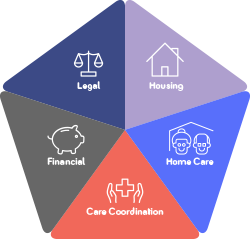
With a new year starting, most people are thinking about goals to set and accomplish during 2019. Maybe you want to resolve to exercise more, eat healthier, or be more productive.
However, did you know that you may be your own biggest barrier to reaching these goals? We have 60,000 to 70,000 thoughts each day, but studies show that more than 80% of these thoughts are negative and 90% are the same thoughts you had yesterday. So it’s up to you to change your thinking, your emotions, and your outlook on life.
Change Your Attitude, Change Your Life
According to Joan Hermann, who hosts the “Change Your Attitude, Change Your Life” radio show, we function from our subconscious mind 95% of the time. Sometimes we can go on “autopilot” and not be fully conscious of how we react or what’s going on around us.
For example, if your doctor mentions you should exercise more often, your first reaction might be to think, “I can’t exercise more, it’s too hard.” That could be your subconscious mind talking. We often make excuses or dismiss options right away. But instead of accepting that immediate response, you can be more aware of thoughts like these to change them.
Two of the most important words that we can say are “I am” and the words that follow. This defines how you see yourself, your behavior, and the choices you make. Rather than saying something negative such as, “I am too fat,” and defining yourself in a negative light, try to say more positive thoughts about yourself and your situation. Find something that you do like about yourself or something that is positive in your situation and recognize it — even if it’s something simple or minor. Being aware of negative reactions is the first step in creating a more productive mindset.
You Are What You Think and Feel
A new science, called epigenetics, shows that the thoughts we have make certain chemicals in our brain that circulate in the body. For example, when you’re happy and feel positive, your brain makes oxytocin, which then creates serotonin. Serotonin improves your mood and helps you sleep. This can lead to your body producing endorphins, which in turn can reduce pain.
In contrast, when you feel stressed, depressed, or angry, your body makes adrenaline, which can increase your blood pressure. Stress can also cause your body to produce cortisol, which is the primary stress hormone, and this boosts sugar or glucose in your bloodstream. Try to do things that increase the positive chemical balance in your body: take a walk, call a friend or eat a balanced meal.
Your Best Age is Now
How we think about ourselves is often defined by how society views certain groups of people. For example, in the United States, the word “menopause” can have a negative connotation. The word can be associated with physical and mental setbacks or a sign of age.
However, in other cultures, menopause is seen as a “second spring” and a beginning. It can be seen as a cause for celebration, starting a new part of life. As a result of this attitude, many of these menopausal women don’t experience the same physical symptoms as in the U.S. The power of the mind can have a big effect on our health and is key to longevity.
Looking Forward to What’s Next
As you start 2019, remember these tips to stay positive:
- Don’t go on autopilot – if you find yourself always thinking negatively, make a conscious effort to turn to positive thoughts.
- How you think affects your health. Happier thoughts can lead to living a longer life.
- No matter what your age is, define yourself on your terms – not on society’s.
Would You Like to Learn More About Having a Positive Attitude and a Long Life?
You can listen to the podcast “Your Best Age is Now” with special guest Joan Hermann. The podcast is available through the Long-Term Living Association (LTLA), which is made up of specialists who provide home care, care coordination, financial, legal, and housing services for seniors and their families.
Visit the LTLA’s website at longtermliving.org or call 1-800-868-1193 to speak with a specialist or set up an appointment.



